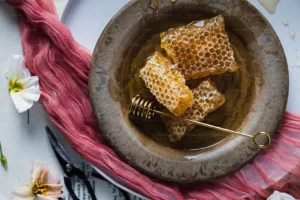Table of Contents
Honey is often praised for its antibacterial properties, abundance of antioxidants, and rich vitamin content. While it may be beneficial for humans, the question arises whether cats can enjoy honey as well. Is it safe to give cats honey as an occasional treat? In this article, we will explore whether cats can consume honey and the potential risks associated with it.
Is Honey Good for Cats?
Honey offers several health benefits for humans, including soothing allergies, providing antioxidants, and possessing anti-inflammatory and antibacterial properties. However, there is limited scientific research to support the claim that honey can have similar benefits for cats. While it is possible that honey may help alleviate allergies in cats, it is advisable to consult with a veterinarian before feeding honey to your feline friend.
Cats and Sweetness
Contrary to popular belief, cats are unable to taste sweetness. This is due to their obligate carnivore digestive systems, which lack the receptors necessary to perceive sweet flavors. While humans may enjoy the sweet taste of honey, cats are more attracted to the fat content in treats like cream or ice cream. Therefore, if you want to treat your cat, it is better to opt for high-protein options such as plain boiled chicken or commercially available cat treats specifically formulated for their dietary needs.
Potential Risks of Honey for Cats
Although cats can consume small amounts of honey without experiencing adverse effects, their digestive systems may not effectively extract any nutritional benefits from it. Cats are primarily carnivores, and their bodies are designed to process meat rather than sugars. Honey consists mainly of fructose and glucose, which a cat’s digestive system may struggle to break down.
It is important to note that diabetic cats should never be fed honey due to its high sugar content. Additionally, honey is not recommended for overweight or obese cats, as it does not provide any nutritional value and can contribute to weight gain. Considering that obesity is a prevalent health issue among cats, it is advisable to minimize their carbohydrate intake.
Potential Complications from Honey Consumption
While most cats do not intentionally consume honey, accidental ingestion may occur. In such cases, a small amount of honey is unlikely to cause long-term harm. However, it can lead to minor health complications, including diarrhea, vomiting, and abdominal pain.
If your cat has consumed honey, it is important to monitor them closely for the next 24 hours. If they exhibit any of the mentioned symptoms or display signs of discomfort, it is recommended to contact your veterinarian for further guidance.
Is It Recommended to Feed Cats Honey?
In general, it is best to avoid intentionally giving honey to cats as a home remedy. Claims that unprocessed honey can help with allergies are largely unproven and require specific types of honey, such as unpasteurized and locally sourced options. Supermarket honey is typically pasteurized and may not offer the same potential benefits. Moreover, these claims have not been scientifically proven to successfully translate to cats. Instead, there are more effective allergy medications available that can be discussed with your veterinarian.
While Manuka honey from New Zealand is known for its remarkable antibacterial, antiviral, and antioxidant properties, it is best to consult with a veterinarian before using it as a wound treatment for your cat. Attempting to replicate professional treatments at home without proper guidance can be risky.
Can Kittens Have Honey?
It is important to ensure that kittens do not have access to honey. Their delicate digestive systems are more susceptible to botulism caused by the presence of bacterial clostridium botulinum spores, which can sometimes be found in raw honey.
Conclusion
In conclusion, it is advisable to avoid feeding honey to cats or kittens. Honey contains high amounts of fructose and glucose, which cannot be efficiently processed by a cat’s digestive system. Feeding honey to cats can increase the risk of obesity, tooth decay, and complications in diabetic cats. While a small accidental ingestion of honey is unlikely to cause serious harm, it may result in digestive issues.
If you are looking to incorporate antioxidants into your cat’s diet, consider dietary supplements, treats specifically formulated for cats, or cat food containing ingredients such as blueberries. Remember to keep honey out of reach from your curious feline friends and reserve it for the enjoyment of human family members.
For more information on cats and honey, visit About Manuka Honey.



